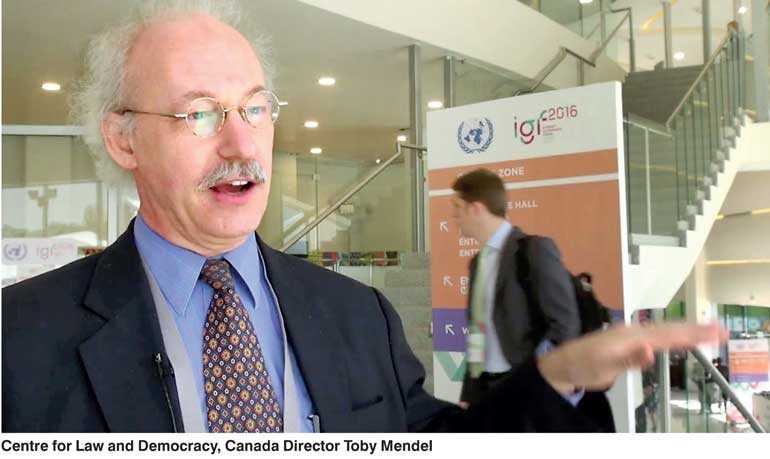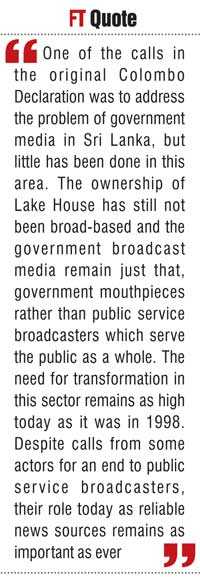Wednesday Feb 25, 2026
Wednesday Feb 25, 2026
Monday, 15 October 2018 00:00 - - {{hitsCtrl.values.hits}}

An event marking the 20th anniversary of the Colombo Declaration on Media Freedom and Social Responsibility was held from 27-30 September. The following are the closing comments of Centre for Law and Democracy, Canada Director Toby Mendel, who was one of the nine international speakers at the occasion
I’d like to begin my closing comments by starting where the process leading to the Colombo Declaration began, namely in a series of criminal defamation cases brought by powerful individuals against editors, senior journalists and newspapers. This attack on media freedom was transformed into a strength as an otherwise divided media community came together to fight back.
As part of the process of fighting back, in 1998 the media community adopted the Colombo Declaration. It was a remarkable achievement: a comprehensive statement of what needed to be done to bring the law and policy environment in the country into line with constitutional and international law protection for freedom of expression and of the media. No one else had done something like that at the time and almost no one else has since. Indeed, the only clear example I know of is Nepal, where I personally worked with local stakeholders and where we specifically used the Colombo Declaration as a source of inspiration.
Another major achievement was the fact that Sri Lanka repealed its criminal defamation provisions in their entirety. Not only was it the first Commonwealth country to do so, but even today only a very small number, including the United Kingdom and Ghana, have followed in its footsteps.
I am not going to try to summarise all of what was said over the last three days as that would take far too long. Instead, I will point to a few key points and highlights of the discussions.
Many speakers welcomed the institutional structures that were put in place as part of this process, namely the Sri Lanka Press Institute (SLPI) and its associated bodies, the Sri Lanka College of Journalism and the Sri Lanka Press Complaints Commission. The fact that these institutions were not only created but remain vibrant today is another remarkable achievement in a world where it is increasingly challenging to establish and maintain media freedom institutions.

The idea that these systems should reach out more systemically to embrace the broadcast and online media was raised repeatedly. This has been discussed many times over the years but so far it has still not happened. Broadening the reach of the SLPI bodies to cover these media sectors would be a very useful area of growth.
Keeping on the institutional point, the need to get rid, once and for all, of the Press Council and, indeed, to repeal the Press Council Act in its entirety, is another clear imperative.
Several speakers noted that supporting media freedom was not only about regulation and law and that Media and Information Literacy has taken on ever greater importance in the modern world. The lines between professional media and so-called social media have become all too blurred and disinformation and rumours have become all too prevalent. Media and Information Literacy can help citizens understand the importance of legacy media content and identify inaccurate content.
State-run media
One of the calls in the original Colombo Declaration was to address the problem of government media in Sri Lanka, but little has been done in this area. The ownership of Lake House has still not been broad-based and the government broadcast media remain just that, government mouthpieces rather than public service broadcasters which serve the public as a whole. The need for transformation in this sector remains as high today as it was in 1998. Despite calls from some actors for an end to public service broadcasters, their role today as reliable news sources remains as important as ever.
Safety was highlighted as a key freedom of expression and media freedom issue. The days of the worst attacks on journalists, during which Sri Lanka was unfortunately a world leader in terms of killings, now seem to be behind us. However, the task of bringing the perpetrators of these crimes to justice, although initiated, has not been brought to completion.
Furthermore, there are still ongoing threats and even attacks. There is also a need, in Sri Lanka and globally, to recognise that attacks on right to information (RTI) activists are just as serious as attacks on journalists, and to bring them within the scope of national and global systems for responding to such attacks.
The second day of this event fell on International Right to Know Day, a day when people around the world celebrate the importance of RTI. The Chair of the Sri Lankan RTI Commission highlighted how much progress has been made in Sri Lanka on this issue, from constitutional protection through Article 14A of the Constitution to the adoption of the Right to Information Act in 2016 and now with strong implementation efforts.
It is true that Sri Lanka has dropped from third to fourth place in the RTI Rating, the leading international assessment of RTI laws, with neighbouring Afghanistan having adopted the strongest RTI law in the world.
At the same time, the progress in terms of implementing RTI in Sri Lanka is impressive by any measure. Leading these efforts is the strong and independent RTI Commission, which has to date issued well over 600 decisions. Requests are not just coming from civil society groups based in Colombo, but from people from all sectors of society and from all over the country. Building a strong base of popular support for the RTI law will be very important to defend it against the pushback that will inevitably come.
Fake news
One of the best lines of the whole conference was the statement: “There is no such thing as ‘fake news’”. Nothing could be truer. “Fake news” is a term coined by an enemy of the press, specifically to attack the press. We should stop giving oxygen to this double-speak and instead focus on real issues, such as deliberate disinformation (which is not news) on social media.
Closely related to this is the need to differentiate between social media and legacy media. Much of the money and attention has gone online but we still need news, by which I mean carefully curated information about current affairs which is prepared by professional journalists, regardless of how it is disseminated.
The new digital environment has created a number of challenges for the legacy media. One is the redirection of funding away from legacy media to social media. Another is the remarkable speeding up of the news cycle. Yet another is how to reach all citizens, including by breaking through the increasingly pervasive information bubbles or silos. Despite these challenges, or perhaps because of them, we need to support the legacy media more than ever.
On the evening of the first day of the conference, the Prime Minister suggested that he was open to the idea of adopting a Contempt of Court Act. There is a large gap between the practice in this area not only in Sri Lanka but throughout South Asia, on the one hand, and democracies in the rest of the world, on the other. In countries not only like Canada and the United Kingdom, but also South Africa and the Philippines, journalists and others are largely free to comment not only on decided cases but also cases which remain sub judice. If Sri Lanka does move to adopt a Contempt of Court Act, it should not just build incrementally on current practice but jump forward to align with better practice standards from around the world.
Training has become far more challenging in the modern media environment and it needs to be very practical in nature. It is not enough to focus on technical issues; the more important need is to foster good journalism. In the end of the day, a good story is a good story and you can learn how to disseminate it effectively.
We are somehow in a brave new world when it comes to technology. Even the notion of journalism being produced by robots using artificial intelligence is no longer simply an idea but, rather, quickly becoming a reality, creating a new set of challenges. It is unclear where this will end up but, at a minimum, media outlets need to build tech into their business models as this is where both efficiency and modern public focus lie.
The conference ended with a session on the power of journalism. Although the title asked whether this was a myth or reality, everyone who spoke emphasised the latter. This was a moving session, with powerful testimonies from young female and male journalists and journalism students who told us why they wanted to work in this difficult and generally poorly paid profession.
Although everyone agreed on the power of journalism, there is a question about how to maintain this in an ever-changing world where attention seems to be increasingly elsewhere, particularly on social media. One way to maintain the power of journalism is to continue to stress its difference from social media and its importance. To achieve this, journalism needs to be free, independent, responsible and ethical. This brings us back to the Colombo Declaration, which sets out the conditions which are necessary for exactly that: a free, independent and responsible media.